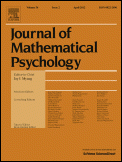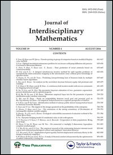
JOURNAL OF MATHEMATICAL PSYCHOLOGY
Scope & Guideline
Innovating Research at the Intersection of Math and Mind
Introduction
Aims and Scopes
- Mathematical Modeling of Psychological Phenomena:
The journal focuses on developing mathematical frameworks to explain various psychological processes, including perception, memory, and decision-making. - Bayesian Approaches and Statistical Methods:
There is a strong emphasis on Bayesian modeling and statistical techniques, providing a probabilistic framework for understanding cognitive processes and experimental data. - Cognitive Assessment and Knowledge Structures:
Research on cognitive assessment methodologies and the structures of knowledge, including polytomous and fuzzy models, is a core area of focus. - Interdisciplinary Applications:
The journal encourages studies that apply mathematical psychology to various fields such as education, marketing, and interface design, showcasing the interdisciplinary nature of the research. - Dynamic and Temporal Models:
Research often explores dynamic models that account for temporal aspects of cognition, including attention and decision-making processes over time.
Trending and Emerging
- Dynamic Bayesian Models:
There is a growing trend towards using dynamic Bayesian models to explain cognitive processes, indicating an increased interest in understanding how cognition evolves over time. - Complex Decision-Making Frameworks:
Recent papers highlight complex decision-making frameworks that incorporate multiple dimensions and attributes, reflecting a shift towards more nuanced models that account for human behavior. - Integration of Cognitive Neuroscience and Mathematical Psychology:
Emerging research increasingly integrates findings from cognitive neuroscience with mathematical psychology, indicating a trend towards interdisciplinary approaches that enhance understanding of cognitive processes. - Advanced Statistical Techniques:
The rise in the use of advanced statistical techniques, such as hierarchical Bayesian methods and machine learning approaches, showcases an emerging interest in utilizing sophisticated tools for data analysis. - Focus on Knowledge Structures:
An increasing emphasis on the development of knowledge structures, particularly polytomous systems and their applications in education and assessment, is becoming a prominent theme in the journal.
Declining or Waning
- Traditional Psychometric Models:
There has been a noticeable shift away from traditional psychometric approaches, such as classical test theory, toward more advanced modeling techniques, including Bayesian and dynamic models. - Basic Cognitive Processes:
Research focusing solely on basic cognitive processes without incorporating mathematical modeling or computational approaches has decreased, as the journal leans more towards complex analyses. - Static Models of Decision Making:
The interest in static models that do not account for the dynamic nature of decision-making processes is waning, reflecting a broader trend towards understanding cognition as a fluid and adaptive process.
Similar Journals

Matematika
Pioneering Research for a Mathematical TomorrowMatematika, an esteemed journal published by PENERBIT UTM PRESS, serves as a pivotal platform for showcasing innovative research in the field of mathematics. With the ISSN 0127-8274, this publication is dedicated to advancing mathematical knowledge and its applications, making significant contributions to both theoretical and applied mathematics. Although currently not offering open access, the journal is recognized for its rigorous peer-review process, ensuring the quality and integrity of published works. With its base in Skudai, Johor, Malaysia, Matematika plays a crucial role in promoting mathematical literacy and research within the ASEAN region and beyond. It invites researchers, professionals, and students to explore and contribute to the vibrant discussions that shape the future of mathematics.

MEMOIRS OF THE AMERICAN MATHEMATICAL SOCIETY
Where Rigorous Research Meets Innovative Solutions.MEMOIRS OF THE AMERICAN MATHEMATICAL SOCIETY, published by the American Mathematical Society, stands as a pillar in the field of mathematics, showcasing rigorous research and comprehensive studies that significantly advance the discipline. With a distinguished history indexed under ISSN 0065-9266 and E-ISSN 1947-6221, this journal features work from leading mathematicians, primarily focusing on both applied and theoretical aspects of mathematics. Over the years, it has continuously ranked in the Q1 category for both Applied Mathematics and Miscellaneous Mathematics, reflecting its high impact within the academic community. The journal maintains its relevance and accessibility through stringent peer-review practices, aiming to foster innovative mathematical ideas and solutions from 1996 to 2006 and from 2009 onward, until 2024. With its impressive Scopus rankings and a strong percentile standing, MEMOIRS OF THE AMERICAN MATHEMATICAL SOCIETY is an essential resource for researchers, professionals, and students alike, dedicated to enriching and broadening the understanding of mathematical sciences.

Journal of Cognitive Education and Psychology
Pioneering Research for Cognitive Growth in Educational SettingsWelcome to the Journal of Cognitive Education and Psychology, an esteemed publication under the SPRINGER PUBLISHING CO, based in the United States. With an ISSN of 1945-8959 and an E-ISSN of 1810-7621, this journal serves as a vital platform for the dissemination of research and scholarly discourse in the fields of cognitive education, developmental psychology, and experimental psychology. Despite its Q4 rankings in the 2023 category quartiles across educational and psychological disciplines, the journal has rapidly built a reputation for contributing significant insights to the development and understanding of cognitive processes in educational settings. While operating under a subscription model, the journal aims to provide quality peer-reviewed articles that foster knowledge exchange among researchers, practitioners, and students. As it converges from the years 2017 to 2022, the journal seeks to bridge the gaps between educational psychology theories and practical application, ensuring that the findings and discussions within its pages can directly inform effective educational practices.

Acta et Commentationes Universitatis Tartuensis de Mathematica
Empowering the Next Generation of Mathematical ThinkersActa et Commentationes Universitatis Tartuensis de Mathematica is a prestigious academic journal dedicated to advancing the field of mathematics, published by UNIV TARTU PRESS. Located in Tartu, Estonia, this journal has been a prominent platform for scholarly discourse since its inception, covering a diverse range of topics in mathematics from theoretical to applied aspects. With an H-index reflecting its contributions to the literature, it holds a notable position in the Q3 quartile ranking for miscellaneous mathematics as of 2023. While it is not open access, the journal aims to disseminate high-quality research that contributes to the academic community and encourages collaboration among mathematicians. As it converges toward the tenth anniversary of its publication in 2024, the journal continually seeks to publish innovative work and foster the growth of knowledge within the mathematical sciences, making it an essential resource for researchers, professionals, and students alike.

JOURNAL OF EXPERIMENTAL PSYCHOLOGY-GENERAL
Exploring the Depths of Cognitive UnderstandingJOURNAL OF EXPERIMENTAL PSYCHOLOGY-GENERAL, published by the American Psychological Association, is a leading journal in the field of experimental and cognitive psychology. With an ISSN of 0096-3445 and a robust impact factor that reflects its significant contribution to research, this journal serves as a premier outlet for empirical studies that advance our understanding of psychological processes across development and cognition. Covering a wide array of topics from developmental neuroscience to general psychology, it is categorized in the Q1 quartile across multiple fields, making it a vital resource for researchers, professionals, and students alike. The journal has maintained a consistent publication record since its inception in 1975, continuously freeing insights that shape the future of psychology and related disciplines. With rigorous peer review and high standards of scholarly excellence, JOURNAL OF EXPERIMENTAL PSYCHOLOGY-GENERAL remains an essential platform for disseminating innovative psychological research.

Eurasian Journal of Mathematical and Computer Applications
Catalyzing Growth in Applied Mathematics and Computer Technologies.Eurasian Journal of Mathematical and Computer Applications, published by the prestigious L N GUMILYOV EURASIAN NATIONAL UNIVERSITY in Kazakhstan, stands as a vital platform for researchers and professionals engaging in the fields of Applied Mathematics, Computational Mathematics, Computer Science Applications, Information Systems, Mathematical Physics, and Modeling and Simulation. With its ISSN 2306-6172 and E-ISSN 2308-9822, this academic journal aims to foster innovative research and facilitate knowledge transfer in these interdisciplinary domains. The journal, which converges its endeavors from 2013 to 2024, is currently ranked Q3 across its various categories in 2023, reflecting its growing influence and commitment to academic excellence. Despite its open access availability, the journal's dedication to quality research is evident as it attracts contributions that not only advance theoretical understanding but also address practical applications. With a supportive community of researchers in an increasingly important field, the Eurasian Journal of Mathematical and Computer Applications is poised to remain a significant resource for those seeking to propel the boundaries of mathematical and computational sciences.

JOURNAL OF INTERDISCIPLINARY MATHEMATICS
Exploring the Intersections of Mathematics for Global ImpactJOURNAL OF INTERDISCIPLINARY MATHEMATICS, published by TARU PUBLICATIONS, is a renowned publication that serves as a critical platform for scholars and practitioners in the field of mathematics, particularly focusing on Analysis and Applied Mathematics. Since its inception in 1998, the journal has provided a robust forum for interdisciplinary research, fostering collaboration across various mathematical domains and enhancing the understanding of complex mathematical concepts. With a commendable Scopus ranking reflecting its quality and impact—Rank #55/193 in Mathematics Analysis and Rank #258/635 in Applied Mathematics—this journal is classified within the Q2 quartile, illustrating its significant contribution to the academic community. Although it follows a traditional subscription model, it encourages accessible scholarship for researchers based in India and beyond. By publishing cutting-edge research, the JOURNAL OF INTERDISCIPLINARY MATHEMATICS seeks to inspire and equip the next generation of mathematicians, making it an invaluable resource for anyone deeply invested in the advancement of mathematical sciences.

Contemporary Mathematics
Navigating the Complexities of Modern MathematicsContemporary Mathematics, published by Universal Wiser Publisher, is a pivotal academic journal dedicated to advancing research in various domains of mathematics, including Applied Mathematics, Discrete Mathematics, Geometry and Topology, and Mathematical Physics. Established in Singapore, this journal serves as a platform for researchers and practitioners to disseminate innovative findings and methodologies, fostering collaboration and knowledge exchange within the mathematical community. With a focus on cutting-edge research, Contemporary Mathematics holds a Q4 ranking across multiple categories in 2023, reflecting its commitment to inclusivity in mathematical discourse. Despite being recognized in the lower quartiles, it plays a significant role for those looking to develop foundational theories and applications that impact broader scientific and engineering fields. While the journal is not open access, it maintains a rigorous peer-review process to ensure the quality and integrity of published works. Since its inception in 2019, it aims to provide an inclusive space for authors from diverse backgrounds, making it an essential resource for researchers, professionals, and students seeking to explore the evolving landscape of mathematics.

Applied Mathematics-A Journal of Chinese Universities Series B
Exploring New Frontiers in Applied MathematicsApplied Mathematics-A Journal of Chinese Universities Series B is a reputable journal published by ZHEJIANG UNIV PRESS, dedicated to advancing the field of applied mathematics. With an ISSN of 1005-1031 and an E-ISSN of 1993-0445, this journal has consistently provided an insightful platform for researchers to publish innovative studies, theoretical advancements, and practical applications that bridge the gap between mathematics and real-world problems. Operating under the rigorous academic standards characteristic of its category, the journal currently holds a Q4 quartile rank in Applied Mathematics and is positioned at the 30th percentile among its peers in Scopus rankings. Encompassing a publication range from 1993 to 2024, it promises to foster collaboration and knowledge exchange among mathematicians and interdisciplinary scholars, ensuring that high-quality research reaches a global audience. Although the journal follows a traditional access model, its significance in the academic community lies in its commitment to facilitating the dissemination of critical mathematical findings that address complex contemporary issues.

International Journal of Applied Mathematics & Statistics
Transforming Data into Decisions with Applied MathematicsThe International Journal of Applied Mathematics & Statistics, published by the CENTRE ENVIRONMENT SOCIAL & ECONOMIC RESEARCH PUBL-CESER, is a vital platform for researchers and professionals dedicated to advancements in the field of applied mathematics and its statistical applications. With an ISSN of 0973-1377 and an E-ISSN of 0973-7545, this journal presents innovative research from 2003 to 2013, offering insights into various mathematical techniques and statistical methodologies fundamental for solving real-world problems. Although its coverage in Scopus has been discontinued, the journal remains relevant within its scholarly community, emphasizing the importance of collaborative research and interdisciplinary approaches for tackling complex societal challenges. Its commitment to promoting qualitative and quantitative research makes it an invaluable resource for students and professionals aiming to enrich their expertise and contribute to ongoing developments in applied mathematics and statistics.